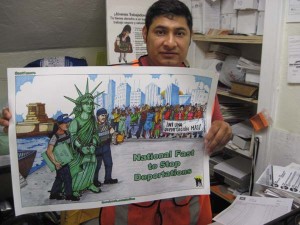A new voice for illegals
The immigration battles in Washington, D.C., lose their abstractness at 6:30 a.m. on Don Bosco Place in Port Chester, where day laborers gather and where a newly incorporated immigrant workers”™ headquarters opened this month.
“I want to say we are all human beings, wherever we come from,” said Carlos Gomez, a 50-year-old Colombian without documentation. “We”™ve got nothing. We”™ve got no choice. You get sick, you have to go to the hospital; then you get a big, big bill. Housing costs a lot. Also, we”™re taken advantage of. Wherever we came from, we need housing; we need education; we need to be legals.”
If Gomez is lucky and an honest contractor or homeowner hires him, he hopes to earn perhaps $125 for the day. If he is lucky again, this being the summer construction season, he might pick up three or four days of work per week.
Gomez has not seen his family in 14 years. “We dream about reform,” he said. “For 14 years no mom, no kids, no family, no brothers. When you”™re illegal, you”™ve got too many problems. Don Bosco and Billy are angels for us.”
Don Bosco is the Don Bosco Community Center on Don Bosco Place, associated with the Holy Rosary Church next door. “Billy” is the church”™s 79-year-old deacon, Billy Vaccaro. He said the national discussion on immigration reform has helped bring a longstanding problem to people”™s attention.
“The whole immigration policy needs to be on a road to citizenship,” Vaccaro said. “We support dictators; we support regimes that torture ”“ and then our companies go down there for cheap labor. Forces are definitely in place that want the status quo. By remaining here to become American citizens and enjoying the American dream, these immigrants become a great asset to the country, like all the previous immigrants who came here.”
Holy Rosary celebrates masses in both Spanish and English. Through the vagaries of history, the church, which was built in 1904, now ministers to a community that was 59.4 percent Latino in the 2010 census. Latinos made up 21.8 percent of the overall population of Westchester County in 2012.
There is a national big picture ”“ it numbers an estimated 12 million or by some estimates as many as 20 million, immigrants living or entering the country without permission ”“ but nearly everything a person needs to know about the immigration issue plays out on the Don Bosco queue of day laborers and, later, the female laborers who also try to eke out livings on the fringes. Some have come for purely economic reasons, but, said Gonzalo Cruz, “Violence is a big factor ”“ people fleeing violence.”
The 34-year-old Cruz is the lone salaried worker at Don Bosco Workers, which incorporated June 10 as a nonprofit. Though new to a corporate letterhead, Don Bosco Workers already helps 200 male workers and, with a push into sectors beyond heavy labor, 50 women. It runs sign-in sheets, enters skills and employers into a database and listens to grievances when, as Gomez put it, “Nobody used to listen.”
“If a woman can paint or do construction, she is welcome for that work, too,” Cruz said. “We also have day laborers who are African-American.”
His initial week heading the new nonprofit was memorable. For six days in June, he ate only honey and drank only water, part of a national hunger strike to bring attention to America”™s day laborers. Three days after ending his fast, Cruz said that he was still getting hot flashes when he ate solid food.
Conversations with day laborers and with Cruz painted a picture of polarized employers not much different than an old Western movie: good guys and bad guys. “Some people are good to work for, responsible contractors,” Cruz said. “And other times, they will look at the worker at the end of the day and say, ”˜I”™m not paying you.”™ They just refuse to pay. And they know the worker is an illegal who in the past probably could not fight them.”
Cruz and other day-laborer activist groups, including Catholic Charities of New York, United Community Centers of Westchester (with offices in Mount Kisco, New Rochelle, Mamaroneck, Yonkers and Port Chester) and Obreros Unidos de Yonkers, are working to change that. With evident pride, Cruz produced a 6-inich-thick sheaf of papers detailing legal actions against allegedly dishonest employers. He cited as his legal backstops county-based attorneys Mark Goldberg of Brady Goldberg in Port Chester and Lee Seham of Seham, Seham, Meltz & Petersen L.L.P., White Plains.
Cruz showed a Westchester County Small Claims Court decision that required back payments of $7,170 to a Don Bosco worker. “That”™s a good letter to get,” he said.
Cases are heard in municipal courts, but there are no barriers: state Supreme Court also hears cases.
“But that gets expensive,” said Goldberg. “A better route is often the Department of Labor.”
Frank Slobig, a former diocesan priest who went on to marry and father five children, never lost his penchant for activism and today is outreach coordinator for Don Bosco Community Center and for Caritas of Port Chester. Now retired, Slobig moved more than three years ago from Washington, D.C., to volunteer with his friend in Port Chester, the Rev. Steve Schenck. “He was the magnet,” Slobig said of Schenck, who died in November 2012.
“Being undocumented makes it difficult to get decent employment,” Slobig said. “One man who comes here is an electrical engineer. We have highly skilled people who have to settle for low-cost jobs. It all hinges on immigration reform. How long it has taken is ridiculous.”
